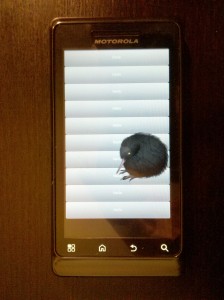Tonight is a wonderful night.
I know that i didn’t announce Kivy officially yet, but i’ll do it in another blog post very soon. You just need to know that Kivy is the next PyMT version. From 2 years ago with thomas, we have regulary doubts and reflections about using Python for PyMT. And i’ve started to look more at the future, and i was deeply convince that for our sake, we must be able to run on a Webbrowser. The goal is simple: same code for every platform, at least what we use every day: Linux / Windows / Macosx / Android / iOS.
Android and iOS are new OS, and we was thinking that except running in webbrowser, we will be never able to run on it. And we have started to target a futur with fewer dependencies, OpenGL ES 2.0 compatible, and so on. This vision have been named Kivy. Theses last days, i’ve removed numpy and pyopengl dependencies. Pygame is the only library required for running an application with widgets. (minimal don’t mean full featured).
And i’ve started to look at the android platform, since Tom from Renpy library have deliver a pygame subset for android. He just made an awesome work. My part was just to understand how it work, and get Kivy compilation done.
For now, here is what i’ve got :
Ok, but what i got exactly ?
- Python/Pygame running from renpytom project
- Failed attempt to use numpy on android
- Kivy adapation for android (opengl debug mode, removing numpy and pyopengl, link on opengl es 2.0…)
- Pygame change to create OpenGL ES 2.0
- Various patch on the build system
And here is my step 2 :
- Send to upstream all the patch on the build system
- Resolve symbol conflict when 2 compiled module have the same name (kivy.event and pygame.event… nice naming.)
- Add a way of detecting Android platform from python
- Add multitouch support to pygame and/or kivy
- Add android sleep/wakeup in kivy
- Write documentation about how to compile a kivy application on android
For now, sleep time ! Enjoy.

